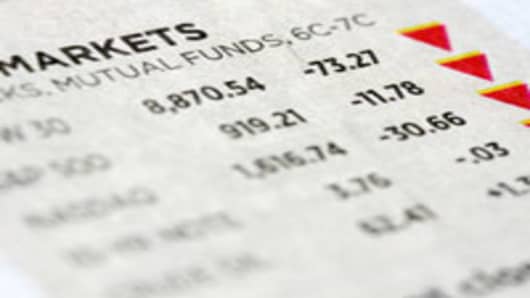"Surely risks associated with us being wrong are low, i.e. rates stay where they are," Roberts wrote in a research note.
"But risks associated with us being right are 10 percent returns in (10-year US Treasurys) and at the same time that equities/commodities will collapse far beyond what even some equity bears anticipate."
As a result Roberts is advising investors to get into maximum long-duration bonds in safe-haven markets.
"This means the US, UK and Germany in that order," he wrote. "Be long gold, think the unthinkable. Get ready for (sub-2-percent yields on two-year Treasurys, sub-2-percent on 10-year bunds) and the UK will not be far behind."
Bulls are, as always, talking up the strength of non-financial firm’s balance sheets and low price earnings ratios, Roberts said. (Click here for world stock markets)
"Call us old fashioned, but we will buy at low price/earning ratios, and sell at high PEs. So a PE now of 20 sits very uncomfortably right at the top of its range if we take out the pre-first Great Depression spike in 1929 and NASDAQ 2000 spike," Roberts wrote.
The note also highlights RBS' fears over the health of the European banking system, shaken by the euro zone debt crisis.
"We have seen downgrades continue in Europe this week," he said. There is also a $450 billion shortage of dollar asset funding for non-US banks, he noted.
Focus on 2a-7
We are amazed there is not now immense market and media focus on the new letters that will bring forward the end-game and worsen it: 2a-7, he said.
This new Securities and Exchange Commission rule "forces US money market funds – up to now the provider of USD liquidity to those who need it – to become 'safer,'" Roberts wrote.
"From what we can see, the USA is basically pulling up the drawbridge and retreating into its fortress, trying to protect its financial system from coming European banking problems," he said.
"But the consequence is clear. Banking is about confidence. If you are reliant on markets to fund yourself and that confidence wanes, a total stop can occur immediately/within days," he added.
'Monster' Quantitative Easing Coming
Roberts is predicting the central banks are going to have to start pumping more money into the system.
"With fiscal policy off the agenda, we have always expected more quantitative monetary easing," he wrote. "And this time will be different. We have always argued that buying of bonds is less efficient than guaranteeing yield levels, and that yields are the key, not raising money supply, given demand for credit is dead."
Having seen previous QE simply lower the banks' cost of raising money, Roberts said there will be a new move.
"The next shock and awe will be in the form of large scale QME (Quantitative Monetary Easing), but with one massive difference – it will be focused on lowering yields, not expanding money supply," he said.
"So do not be surprised if the next QME is about guaranteeing yields at, say, 2 percent on the (10-year US Treasury) or lower," he wrote.



